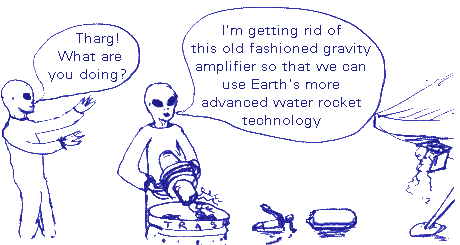The Grey Quartet
plays
The
famous "Minute Waltz" especially adapted for
bottles.
in
Db, Op.64 No.1
by
Frédéric François Chopin (1810-1849)
followed by
Andante Cantabile also adapted for bottles
from
String Quartet No.17 in F,
Op.3, No.5
by
Franz Joseph Haydn (1732-1809)
Click Here to hear the music while you browse
| Download | Install | UFOs - You decide | They're Here :-) | Build Your Own |
|---|
Ever since they unexpectedly "landed" near a little place called Roswell in New Mexico USA following protracted Independence Day festivities in 1947, the Cultural Assessment Adaptation and Integration Unit from Zeta 1 Reticuli has been turning their hand to acquiring Earth skills including:
- Playing Music (of all types);
- Growing and smoking Peyote (Lophophora Williamsii); and,
- Making alcoholic beverages - making special use of distillation techniques.
Their initial "tour" included seeing some of the sights in the US: Fort Worth; Nellis; Wright Patterson and so on. Since then, they have travelled abroad extensively, entertaining top level secret military personnel with their renditions of famous composers whom they claim to have met personally on previous missions.
Surprisingly, the quartet has not aged much in the last 50 years. "It is all of this good life that you are treating us to" says Boris, lead bottle player. "We have stayed a little longer than we had originally anticipated this time, we only expected to stay for around 10 years before returning home and clocking up a few more missions. On and off, I've been on this planet of yours for the last 350 years.
"One of the real plus-points is this fantastic recipe for Buckwheat Burgers that we found. We've always eaten Buckwheat, in fact there are some traditions that we've managed to establish that involve leaving out buckwheat pancakes for us to eat, but these are really good."
The spritely quartet has adapted well to their situation. "When we started out, there was not much in the way of available technology so we used the bottles that were to hand and we've kind of gotten to like them - it was difficult obtaining the bass bottles but once we'd gotten hold of some, we haven't really looked back". The quartet specialises in European Chamber Music (sometimes called "Classical Music") and especially enjoyed their time with J S Bach discussing unified field theory and the direct relationship between music and mathematics..
Boris' particular favourite is the Andante Cantabile from Haydn's String Quartet No.17 in F. Boris and Franz spent many a night in the local bier keller collaborating on the piece on the back of beer mats. "They are especially useful if you split them down the middle," he says, "it gives you two sides to write on".
Second bottle player Richard's favourite is Frédéric Chopin's Minute Waltz. "We've been fans of this little piece since we started listening to BBC Radio 4's Just a Minute about 30 years ago. Kenneth Williams' performances were classics. We shall all miss him."
![]() There have, of
course, been spin-offs from the mix of Earth
technology and the rather more established technology
of the visitors. Not only have the
"invention" on Earth of some technological
advances been attributed to the group by some but a
few more important modern fashion influences are also
ascribed - recent styling of sunglasses in the late
1990s being one example.
There have, of
course, been spin-offs from the mix of Earth
technology and the rather more established technology
of the visitors. Not only have the
"invention" on Earth of some technological
advances been attributed to the group by some but a
few more important modern fashion influences are also
ascribed - recent styling of sunglasses in the late
1990s being one example.
The advancement that they are most proud of is, of course, the saxophone. 'Once we had explained to Adolphe that the conical bore of the instrument not only helped in the uniform amplification of all of the notes,' Boris explains, 'but also means that the second layer of notes overlays the first at an interval of one octave, twice the frequency, and not three times, as you get in a parallel bored instrument such as the clarinet, it was easy to get him to adopt the idea as his own.
'The fact that you get a richer sound for the more bends that you put in the crook of the instrument is just the icing on the cake and the baritone and bass saxophones are by far the best of them all' he continues.
 |
Zeta 1 Reticuli's Cultural Assessment Adaptation and Integration Unit have also had a hand in the invention of the aeroengine. 'The key to development is the increase in the power to weight and power to volume ratios for various power sources.' Richard explains. 'The internal combustion engine is only so good but to develop power sources that are concentrated enough to make space flight practical, you need something better. Our power assessment vehicles - Foo Fighters, you called them - found that you seemed to be ignoring jet power. Jet power is of course the next logical step, our predecessors had first introduced this many centuries before. Frank Whittle came along and he just seemed to be the right stuff - so to speak - making a flight in a Gloucester E28/39 in 1941 from RAF Cranwell.'
The tracks you are listening to (if your computer is set up correctly) are accurately digitised MIDI versions from one of the quartet's performances back in 1967, literally a few years before Neil Armstrong visited bass bottle player Ruben's relatives on the Moon.
If the music doesn't sound too good, (bearing in mind the fact that it was originally played by non-earth-originating, non-professionals) then your computer synthesiser is probably not up to it. You should be playing this on a computer equipped with an XG synthesiser. You can download software versions of these from various sites.
![]() Your computer should have some sort of MIDI support with it
Your computer should have some sort of MIDI support with it
but just in case it doesn't, you can get a free MIDI plug-in from YAMAHA
Copyright © Yamaha Corporation All
rights reserved.
| Download | Install | UFOs - You decide | They're Here :-) | Build Your Own |
|---|
